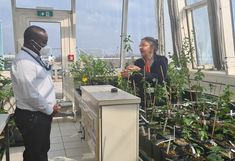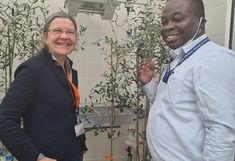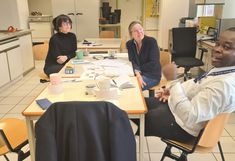Visit of Dr. Isaac Kofi Bimpong from Joint FAO/IAEA Division of Nuclear Techniques in Food and Agriculture Vienna, Austria to the PBU
On March 4th, 2022 Dr. Isaac Kofi Bimpong from Plant Breeding and Genetics Section Joint FAO/IAEA Division of Nuclear Techniques in Food and Agriculture Vienna, Austria visited the PBU lab in the frame of the Coordination Research Project: Development of Integrated Techniques for Induced Genetic Diversity and Improvement of Vegetatively Propagated and Horticultural Tree Crops (D24014) supported by Food and Agriculture Organization of the United Nations and the International Atomic Energy Agency.
The aim was to discuss together with Dr. E. Borroto-Fernandez and Univ.Prof. Dr. Laimer the impact of vegetatively propagated crops (VPCs) and horticultural tree crops (HTCs) playing an important role in food security and income and representing significant agricultural opportunities in most countries of the globe. However, due to limited genetic diversity, their improvement has been very slow as they cannot be easily self or cross-pollinated to produced seed or expand variation.
Climate change further worsens this situation by causing serious production losses from factors such as intensifying and transboundary spread of pests and pathogens. To date, very few VPCs and HTCs have been improved or developed through induced genetic variation and released for cultivation compared to seed-propagated crops. To meet the rising demands for food and nutrition without adverse environmental footprints, it is imperative to develop efficient methodologies and protocols capable of overcoming these limitations associated with plant mutation breeding in VPCs and HTCs.




